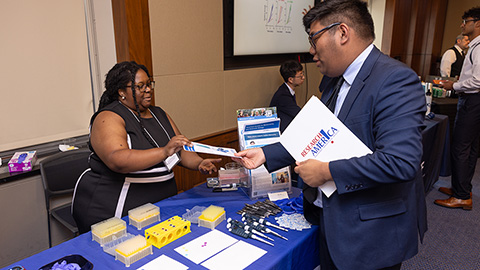ASBMB backs bills to bolster minority-serving institutions
The American Society for Biochemistry and Molecular Biology endorsed two bills in April that would expand research infrastructure and STEM graduate programs at historically Black colleges and universities and increase graduation rates at Hispanic-serving institutions.
The HBCU Research, Innovation, Security and Excellence Act, or HBCU RISE Act, calls for the creation of a pilot program to help certain HBCUs increase their research capacity and become more competitive for defense contracts and grants. The Hispanic Educational Resources and Empowerment Act of 2022, or HERE Act, aims to support partnerships between certain colleges and high schools to increase college attendance and graduation rates among Latinos.
The HBCU RISE Act
As one of the nation’s largest science and technology funding agencies and employers, the Department of Defense invests billions in basic science research annually. However, HBCUs receive only a small percentage (0.4% in 2019) of Defense Department research and development funds.
In 2020, the National Defense Authorization Act required the secretary of defense to partner with the National Academies to conduct a study of Defense Department–funded research at HBCUs and other minority-serving institutions. The study showed that HBCUs and other MSIs receive a disproportionally smaller share of R&D-related funds than non-MSIs. It also found that increasing research capacity at HBCUs would make them more competitive for DOD grants and contracts.
If passed, the HBCU RISE Act would direct the secretary of defense to establish a pilot program to increase capacity at “high research activity status” (R2) HBCUs so that they can reach “very high research activity status” (R1).
Currently, no HBCUs are classified as R1 by the Carnegie Classification of Institutions of Higher Education.
“Growing research capacity at HBCUs is a good use of U.S. taxpayer dollars. R1 status will increase the visibility of cutting-edge research already being conducted at HBCUs, open new doors for collaboration, diversify the STEM workforce and fuel the American economy,” the ASBMB wrote in its endorsement of the RISE Act.
Indeed, investing in HBCUs not only will increase their research capacity and visibility but also will support those who work to ensure the STEM pipeline is diverse.
U.S. Sens. Chris Van Hollen, D-Md., and Thom Tillis, R-N.C., teamed up to present the bipartisan legislation in the Senate, and U.S. Rep. Alma Adams, D-N.C., introduced a version in the House.
Van Hollen said in a statement in April: “HBCUs provide a quality education, a unique experience, and an enriching environment for thousands of students. Supporting their growth and research capabilities is key to supporting their students, faculty, and staff and to creating a more diverse pipeline for careers in STEM.”
The HERE Act
Hispanic-serving institutions are leaders in educating the most diverse and low-income student population in the nation. They enroll 66% of all Latino undergraduate students and 31% of Pell Grant recipients, and they graduate 40% of Hispanic and Latino bachelor’s degree holders in STEM, making them key institutions for producing a more diverse STEM workforce.
However, for the first time in 20 years, the number of HSIs decreased in 2020 due to enrollment decline, institutional closings and consolidation.
The HERE Act was introduced by U.S. Rep. Joaquin Castro, D-Texas, and Sen. Padilla, D-Calif., in the U.S. House of Representatives and the Senate, respectively.
“The stark gap in college attendance and completion rates for Latino students in the United States is unacceptable,” Padilla said in a statement in April.
The bill would authorize a new $150 million grant program to support partnerships between HSIs and school districts with high enrollments of Latinos for the purpose of improving college attainment of Latino students.
The awarded institutions will be tasked with creating a college-bound culture among students, improving postsecondary educational preparedness, supporting high school completion and the college application process, developing programs to encourage students to pursue teaching as a career, and addressing nonacademic barriers to college enrollment, such as child care and food insecurity.
“We need to take action to invest in our students’ success and strengthen our workforce. The HERE Act would improve collaboration between local school districts and colleges and universities to ensure Latino students have the resources and support they need to succeed as they obtain higher education,” said Padilla.
Read ASBMB's endorsement.
Why we need to invest more in MSIs
MSIs first emerged during Reconstruction in response to a history of inequity, lack of access to majority institutions for historically marginalized groups, and significant demographic changes in the country.
Although they make up 14% of Title IV–eligible institutions of higher education, MSIs produce 20% of STEM undergraduate degrees. However, MSIs continue to be severely underfunded. A National Science Foundation report last year stated that there has been a decline in research and engineering funding to HBCUs since the early 2000s.
For the STEM ecosystem to flourish, it needs talented people with diverse experiences, ideas and motivations. Eliminating funding disparities will ensure that more people from historically marginalized groups enter the STEM workforce.
A 2013 report by the Rutgers Center for Minority Serving Institutions, then called the Penn Center for Minority Serving Institutions, said it best: “Now an integral part of American higher education, MSIs … have carved out a unique niche in the nation: serving the needs of low-income and underrepresented students of color.”
The ASBMB urges Congress to pass these pieces of legislation to bolster STEM research capacity at MSIs and strengthen the STEM workforce.
Enjoy reading ASBMB Today?
Become a member to receive the print edition four times a year and the digital edition monthly.
Learn moreGet the latest from ASBMB Today
Enter your email address, and we’ll send you a weekly email with recent articles, interviews and more.
Latest in Policy
Policy highlights or most popular articles

Embrace your neurodivergence and flourish in college
This guide offers practical advice on setting yourself up for success — learn how to leverage campus resources, work with professors and embrace your strengths.

ASBMB honors Lawrence Tabak with public service award
He will deliver prerecorded remarks at the 2025 ASBMB Annual Meeting in Chicago.

Summer internships in an unpredictable funding environment
With the National Institutes of Health and other institutions canceling summer programs, many students are left scrambling for alternatives. If your program has been canceled or delayed, consider applying for other opportunities or taking a course.

Black excellence in biotech: Shaping the future of an industry
This Black History Month, we highlight the impact of DEI initiatives, trailblazing scientists and industry leaders working to create a more inclusive and scientific community. Discover how you can be part of the movement.

ASBMB releases statement on sustaining U.S. scientific leadership
The society encourages the executive and legislative branches of the U.S. government to continue their support of the nation’s leadership in science.

ASBMB and advocacy: What we accomplished in 2024
PAAC members met with policymakers to advocate for basic scientific research, connected some fellow members with funding opportunities and trained others to advocate for science.

